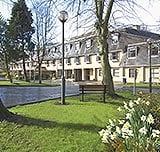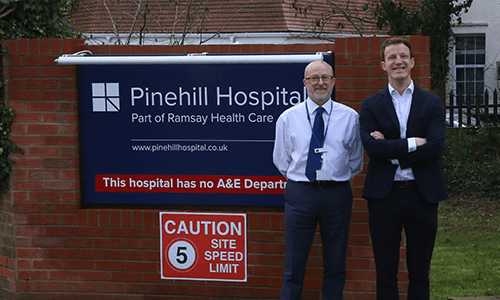Age-related macular degeneration (AMD) is a leading cause of vision loss, affecting millions worldwide. It primarily damages your macula, the part of your retina responsible for sharp, central vision, making everyday tasks like reading and recognising faces more difficult.
Early detection, lifestyle changes and treatment can help slow the progression of AMD and preserve your vision.
What is age-related macular degeneration?
Age-related macular degeneration is an eye condition that affects your central vision. It makes tasks like reading, recognising faces, driving, texting, browsing the internet and online shopping difficult. Performing close-up work, such as sewing, painting, and writing may require additional lighting or magnification.
AMD occurs when your macula, the part of your retina responsible for sharp vision, deteriorates over time. While AMD doesn't cause complete blindness, it can significantly impact your quality of life. Early detection, lifestyle changes and treatments such as anti-VEGF injections can help slow its progression.
Symptoms of AMD
The symptoms of AMD depend on its stage. Here’s a breakdown of each stage:
- Early AMD - often has no noticeable symptoms, but drusen (yellow deposits) may be present on your retina.
- Intermediate AMD – you may experience mild blurring of your central vision, difficulty seeing in dim light, and an increase in drusen size or number.
- Late AMD – you can expect significant central vision loss. There are two forms:
- Dry AMD - gradual deterioration of your macula leads to progressive vision loss.
- Wet AMD - sudden and severe vision loss due to abnormal blood vessel growth and leakage in your retina.
Diagnosis of AMD
AMD is typically diagnosed through a combination of eye exams, imaging tests, and symptom evaluation. Since early stages of AMD may not present noticeable symptoms, regular eye check-ups are essential for its early detection.
Diagnostic Methods
- Dilated Eye Exam - an ophthalmologist or optometrist uses eye drops to widen your pupils, allowing them to examine your retina and macula for signs of damage, such as drusen (yellow deposits).
- Amsler Grid Test - you look at a grid pattern to detect distortions or gaps in your vision, which could indicate AMD progression.
- Optical Coherence Tomography (OCT) - provides detailed cross-sectional images of your retina, helping to identify changes in macular thickness.
- Fluorescein Angiography - injects a dye into one of your veins and images of your retina are taken to check for abnormal blood vessel growth, which is typically associated with wet AMD.
- Genetic Testing - non-routine, but may be used to assess hereditary risk factors for AMD.
Causes of AMD
AMD develops due to a combination of genetic, environmental, and lifestyle factors. While the exact causes remain unclear, research has identified several key contributors:
- Age - this is the primary risk factor. AMD is more common in individuals over 50.
- Genetics - your family history plays a role. Certain genetic mutations increase your susceptibility to AMD.
- Smoking - significantly raises your risk of developing AMD and accelerates its progression.
- Diet and Nutrition - a low intake of antioxidants, omega-3 fatty acids, and certain vitamins can contribute to retinal deterioration.
- Sunlight Exposure - prolonged exposure to UV and blue light may increase damage to your macula.
- High Blood Pressure and Cardiovascular Disease - poor circulation can impair your retinal health and increase your AMD risk.
Lifestyle Changes
Early diagnosis and management can help slow progression of AMD and preserve your vision. Lifestyle changes can help slow the progression of AMD and support overall eye health. Here are key adjustments that may benefit those with AMD:
- Eat a Nutrient-Rich Diet - foods high in antioxidants, omega-3 fatty acids, and lutein (like leafy greens, fish, nuts, and eggs) help protect retinal health.
- Quit Smoking - can slow AMD progression.
- Protect Your Eyes from UV Light - wearing sunglasses with UV protection reduces light-induced retinal damage.
- Manage Your Blood Pressure and Heart Health – lower blood pressure improves circulation to your retina to support eye function.
- Exercise Regularly - physical activity improves blood flow, reducing the impact of AMD-related vision loss.
- Take AREDS Supplements – these high-dose vitamin and mineral formulations, based on the AREDS studies, can help slow the progression of dry AMD.
- Use Vision Aids and Good Lighting - magnifiers, specialised glasses, high-contrast screens, and proper lighting can make daily tasks easier.
- Schedule Regular Eye Exams – for the early detection and management of AMD progression.
Treatment for AMD
While there is no cure for AMD, several treatments can help slow its progression and preserve your vision. The best approach depends on the type of AMD, dry or wet, that you have. For wet AMD, injections are the most effective treatment, helping to prevent vision deterioration and, in some cases, improve clarity.
Anti-VEGF Injections: The Gold Standard for Wet AMD
Wet AMD occurs when abnormal blood vessels grow beneath your retina, leading to fluid leakage and damage. Anti-VEGF injections block vascular endothelial growth factor (VEGF), a protein that promotes abnormal blood vessel growth. By inhibiting VEGF, these injections help stabilise and, in some cases, improve vision.
Key benefits of anti-VEGF injections:
- Reduce blood vessel growth to prevent further retinal damage
- Help maintain and, in some cases, restore vision
- Are minimally invasive and well-tolerated by most patients
Treatment typically requires regular injections every 4 to 8 weeks, depending on your individual response.
Side Effects of AMD Injections
Anti-VEGF injections for AMD are generally safe but may cause mild side effects like redness, irritation, blurred vision, and light sensitivity, which usually resolve quickly.
Less common effects include temporary eye pressure changes and floaters Rare but serious complications, such as infection, retinal detachment, or severe bleeding, require immediate medical attention.
AMD Injections Available at Ramsay Health Care UK
For those seeking expert and safe care, Ramsay Health Care UK offers AMD injections as part of their comprehensive ophthalmology services. Our specialised and easy access clinics provide anti-VEGF therapy to effectively manage wet AMD and preserve your vision.
Other AMD Treatment Options – Laser Therapy
While injections are the primary treatment for wet AMD, in certain cases, laser therapy may be used to seal leaking blood vessels in wet AMD.













